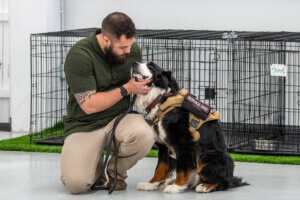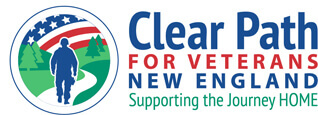The Clear Path for Veterans Service Dog Program works with veterans who have Post-Traumatic Stress Disorder (PTSD), Traumatic Brain Injuries (TBI), and Military Sexual Trauma (MST). The Veterans in the program benefit from working with the dogs in multiple ways.
We encourage Veterans to leave the house and come to Clear Path for Veterans New England to work with the dogs in the Service Dog Program. This helps the Veteran by Not self-isolating and by giving the Veteran a purpose. Having a purpose is essential for the Veteran as it gives them a reason to move forward with the healing process.
Service dogs help Veterans, but it helps more than just the Veteran. A Service Dog can help the Veteran and their family; with assistance from the dog, the family can do more together, creating more family time. A Service dog helps the Veteran keep a job and helps with work productivity.
A Veteran with PTSD, TBI, or MST may struggle and have to leave work or not come to work due to anxiety, depression, or inability to sleep. The Service dog with the
 Veteran at work can help the Veteran by alerting the Veteran before these symptoms become disabling. It enables the Veteran to work better, and the work productivity improves. Having a Service dog helps the veterans do more in their communities as with the assistance of the dog; they can go more places that may have made the Veteran uncomfortable in the past. Lastly, a veteran is more likely to talk with other Veterans about their dog. This provides more information about the Service Dog Program to other Veterans who may need help.
Veteran at work can help the Veteran by alerting the Veteran before these symptoms become disabling. It enables the Veteran to work better, and the work productivity improves. Having a Service dog helps the veterans do more in their communities as with the assistance of the dog; they can go more places that may have made the Veteran uncomfortable in the past. Lastly, a veteran is more likely to talk with other Veterans about their dog. This provides more information about the Service Dog Program to other Veterans who may need help.
While working with the Service Dogs in training, the Veterans are working with other Veterans. It creates a self-peer group where Veterans realize they are not alone. They can talk with other veterans who have gone through similar events. It also creates new friendships among the Veterans in the program.
The Veterans are learning new skills by working with the dogs. The veterans will learn how to relax and move slowly with the dogs. This is important because if the Veteran is moving fast and unclear with the dogs, the dogs will not understand what the Veteran is asking. Learning how to relax and slow down will help in everyday life as it will help the Veteran assess a situation and respond appropriately.
The Veteran will work on public access as a group and with the dogs. This will help the veteran work in different environments they may have a hard time in with the assistance of the group and dogs. While working in various settings with the dog will help the Veteran learn how the dog can be beneficial for the Veteran in different scenarios.
Veterans will then work on task work with the dogs. Task work is individualized for each Veteran. When the dog learns how to read, the Veterans cues when they are anxious, depressed, afraid, or having nightmares. Movement such as tapping of the foot, scratching hands or face, swaying or pacing, and moving while sleeping. These are some cues the dog can see and alert the Veteran they are ok or wake them up.
If you would like to support our Service Dog program and are interested in applying for a Service Dog, or would like to become a Service Dog Foster, please click below.
The generosity of grants and support donations funds our program. If you would like to support our program, please click below.
Clear Path for Veterans New England
Main Office
84 Antietam St, PO Box 2073
Devens, MA 01434
Phone: 978-384-8800
Hours: 8 AM–4:00 PM M-F
Lawrence Location
130 Parker St
Unit 30
Lawrence, MA 01843
Phone: 978-965-5743
Hours: 8 AM–4:00 PM M-F
New Hampshire Location
977-1001 Elm Street
Suite 304B and 304C
Manchester, NH 03101
Phone: 978-504-0810
Hours: Office Hours by appointment



